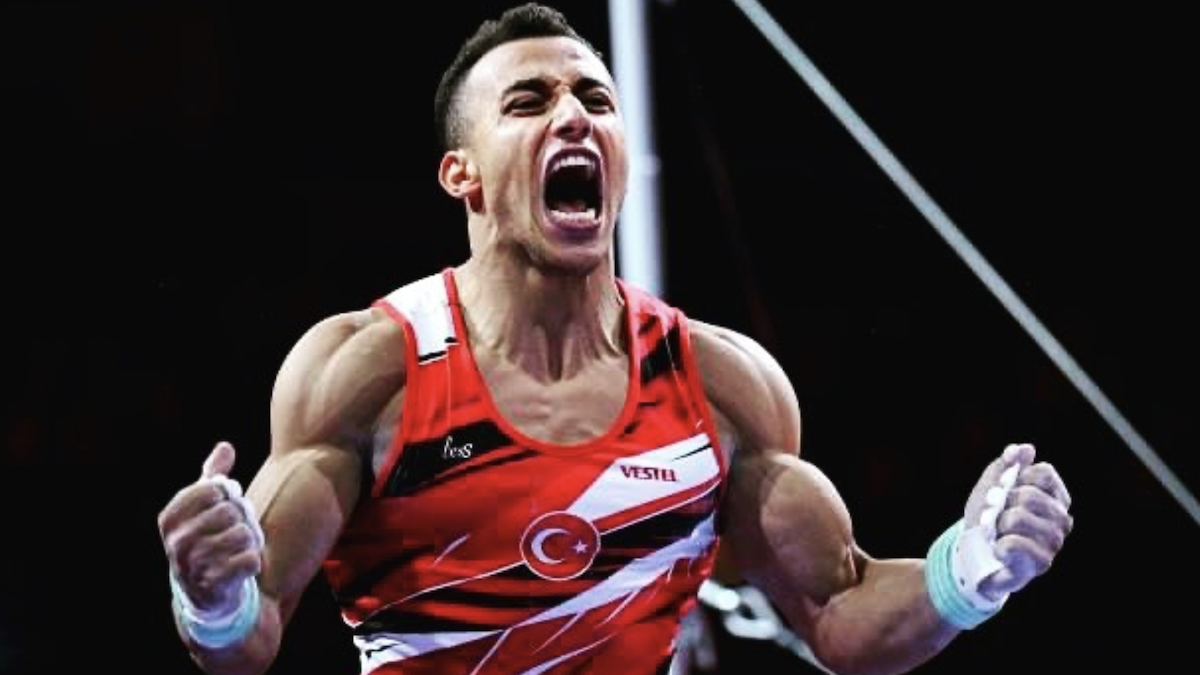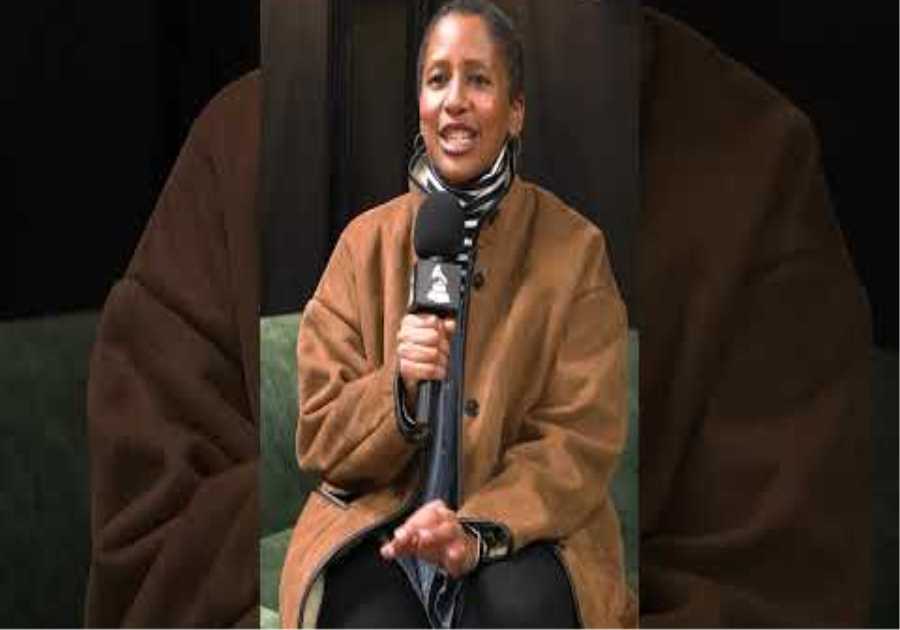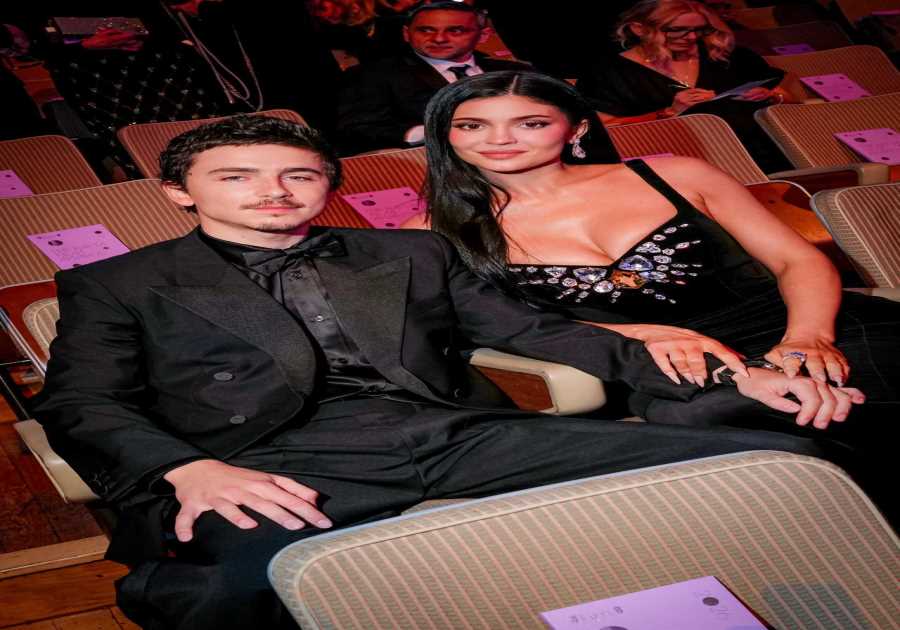
Adem Asil
The men’s competition at the Paris Challenge Cup gave us chaos and surprises at nearly every turn, with 2022 European all-around bronze medalist Adem Asil of Turkey leading the gold medal standings after big wins on rings and vault.
Ireland also had a super successful meet, with Eamon Montgomery winning the gold on floor while Rhys McClenaghan claimed the pommels title, and the afternoon wrapped up with Caio Souza of Brazil winning p-bars and Brody Malone of the United States winning high bar.
FLOOR EXERCISE
Montgomery’s win here was a happy surprise after he qualified in seventh. With a couple of tenths of improvement in his execution compared to his prelims routine, he ended up not only taking advantage of a couple of the top contenders falling, but also beating a couple of guys who had similarly strong routines.
His passes here included a double double, front full to double front, randi, double full, 2 1⁄2 to front layout, front double full to barani, and a stuck triple full. There were little things throughout the set, with minor landing and ankle form deductions the most noticeable, but while there were a few cleaner routines, Montgomery had the most impressive combination of difficulty and execution among the guys here, finishing with a 14.25 to secure the top spot as the first competitor in the final.
Tang Chia-Hung of Taiwan and Benjamin Osberger of France finished just behind him with scores of 14.2, though Tang won the tie-break by a tenth to win the silver while Osberger won the bronze.
The routine we saw from Tang was glorious in its execution, including on a big half-in half-out, front full to front double full, 2 1⁄2 to front layout, flairs, a double full, and a triple full with a small hop to the side. Most of his landings were stuck, and his positions in the air were so good, it was great to see him step out ahead of most of the pack despite having the lowest D score in the final.
Osberger also had some great work in his set, including on a randi, double double, 2 1⁄2 to front layout to front full, double full, front double full to front tuck full and triple full at the end. He had a few areas that needed some greater attention to detail in the air, but overall it was a fantastic routine with lots of potential, especially as a younger and less experienced member of the team hoping to make waves at the senior level this quad.
Rounding out the field were Tsuruma Ryota of Japan in fourth with a 13.85, William Emard of Canada in fifth with a 13.5, Kaneta Kiichi of Japan in sixth with a 13.45, Yuri Guimaraes of Brazil in seventh with a 12.35, and Artem Dolgopyat of Israel in eighth with an 11.9.
The Japanese men both had mostly promising and solid sets, with Tsuruma one of the standouts here, while Kaneta had a couple of short passes, including a 2 1⁄2 to front tuck that landed in a squat with a big hop as well as a long and low triple full at the end, while Emard started out with a few weak spots, especially on the front double full to double front, but he cleaned up quickly and had some moments that were fabulous as well, especially on the stuck full-in and 2 1⁄2 to a floaty front layout.
As two of the top contenders in the competition, it was very unfortunate to see both Guimaraes and Dolgopyat count falls, with Guimaraes missing the set out of his 2 1⁄2 and sitting the subsequent punch front tuck and nearly sitting his double front at the end, while Dolgopyat sat his opening front double full to piked double front and crashed his full-twisting double tuck at the end of his set.
POMMEL HORSE
A pommels final without any falls?! We love to see it, and even more, we loved seeing McClenaghan back on top with a stunning set that included brilliant transitions, smooth fluidity, and superb hip extension. He performed his most difficult set of the year here, with a 6.4 D score awarded for a total score of 15.1, making it especially important for him to get such a solid hit in during the lead-up to world championships, as he’s had some struggles throughout the season thus far.
Nariman Kurbanov of Kazakhstan came back from a fall in prelims to win the silver with a 14.45, showing mostly strong work throughout, while Shiao Yu-Jan of Taiwan won the bronze with a 14.35. I loved his transitions between circling on the single pommel down to Russians between the handles, and aside from some minor ankle form when traveling in front support and some leg separation into the dismount, he looked really tidy and controlled throughout.
We saw more great work from Zachary Clay of Canada in a close fourth place with a 14.3, Vedant Sawant of Australia in fifth with a 14.25, and Filip Ude of Croatia in seventh with a 13.65, while Tsumura Ryota had to fight through a few rhythm breaks and a short handstand to finish sixth with a 14.05 (he had the most difficult routine in the competition with a 6.5 D), and Ferhat Arican of Turkey finished eighth with a 13.4, looking a bit out of sorts from the start with adjustments to get through nearly every skill, though it was great to see his fight all the way through to the dismount.
STILL RINGS
The final podium standings here exactly mirrored the prelims rankings, with Asil taking the gold with a 14.8 ahead of Vinzenz Höck of Austria with a 14.7 for silver and Donnell Whittenburg of the United States with a 14.6 for bronze.
All three had routines that demonstrated high levels of strength and control, and it’s been great to see the consistency growing for all three of these athletes, who have kind of been underdogs on this event in one way or another. Asil had a fabulous set with mostly strong positions throughout, while Höck had only minor adjustments and one especially brilliant handstand position before sticking his full-twisting double layout, and Whittenburg kicked off the rotation with a fantastic maltese pressed up to planche, and capped off his routine with a stuck double double layout dismount.
The rankings also included a strong routine from Lin Guan-Yi of Taiwan in fourth with a 14.45, Ali Zahran of Egypt in fifth with a 14.25, Sokratis Pilakouris of Cyprus in sixth with a 13.95, and Tsumura Ryota of Japan in seventh with a 13.9.
Caio Souza had a very strong set going from the start, with just a couple of handstand deductions at the end the only major issues in the meat of the routine, but he went for a big triple back dismount and unfortunately came up slightly short, punching out of it into a somersault to finish eighth with a 13.5.
VAULT
Coming off of a win on rings and coming back from falling on his second vault in prelims to qualify in last place, Asil picked up his second gold of the meet with two mostly strong runs in a final that was frankly terrifying as a whole.
Asil often struggles with consistency on vault, usually hitting both attempts in prelims but then missing one – and missing the podium – in finals, so it was nice to see a little twist of fate here with just the opposite happening. Neither of his vaults were at a hundred percent today, with his handspring double front pike half strong in the air but landed incredibly low with a big hop out of the squat for a 15.0, while his tsuk double pike had a big lunge to the side out-of-bounds for a 14.45, averaging a 14.725 to rocket ahead of the rest of the guys in these rankings.
His win came ahead of prelims leader Souza, who had two cleaner vaults with his Dragulescu and kaz 1 1⁄2, but being back by eight tenths in difficulty held him back in the silver medal position with a 14.575, while Dolgopyat came back from his falls on floor to hit a kaz 1 1⁄2 and handspring double front, with the former landed in a bit of a squat, though the latter was very nice, and he averaged a 14.325 for the bronze.
The rest of the competition here was a bit wild. Joel Plata of Spain finished fourth with a 14.025 average after coming up short on his Dragulescu but then nailing a clean and stuck Yurchenko double, Omar Mohamed of Egypt was fifth with a 13.775 after opening with a really strong Shewfelt but then sitting his handspring double front, Guimaraes – who qualified second – was sixth with a 13.475 after hitting his huge kaz 1 1⁄2 with a lunge forward but then dropping to his hands and knees on the handspring double front, and Thomas Grasso of Italy was seventh with a 12.775, coming up slightly short with some leg form and a stumble on his Yurchenko triple, but then missing the block on his intended kaz double full, instead doing just a tsuk tuck.
But the scariest moment was a fall from Asato Keisuke of Japan, who qualified in fourth place, but had a really terrifying landing on his tsuk full-in, which came down a bit low and landed horizontally, with his hands and head/neck hitting the mat before his feet, resulting in a 0 in addition to a scare, as the medics came up to check him out. They cleared him after just seconds, and though he initially exited the podium, he eventually opted to go for his second vault, a kaz double full which came up short with another fall.
I’m not a doctor or a medic or a coach, but with that kind of landing affecting his head and neck the way it did on his first run, I don’t see how just a few seconds of attention was enough to clear him of anything potentially severe, and even though he “looked fine” and was walking on his own pretty soon after the fall, I think it was really irresponsible for his coaches and medics to allow him to do the second run, especially given its difficulty and potential for even greater injury. Asato is an adult man, but in situations like these, athletes are very much “go go go” and want to prove to themselves that they’re fine, but this is exactly where and when someone should have stepped in and suggested that he chill.
Maybe they did. I don’t know everything (or anything) that was said in his brief check-in, so perhaps there were people who cautioned against getting back onto the podium, but it was very scary to see him try a second vault and while I’m glad he was able to walk away, I still wish someone was like “sorry, but no.”
PARALLEL BARS
Normally one of the least dramatic apparatuses in most competitions, I felt like both prelims and the final were wildly off here, with far more falls and mistakes than we typically see.
Souza did a fabulous job in his routine to swoop in for the gold with a 14.7 ahead of Malone with a 14.6 for the silver medal, while Whittenburg surprised to take the bronze with a 14.2, a big jump up from his seventh-place spot in qualifications. Both Souza and Malone performed cleanly with almost no adjustments and capped off with solid dismounts, and though Whittenburg – who was the first up in the rotation – was a bit shaky on some pirouettes early in his set, his salto elements were supreme and he had just a small hop back on the double front half dismount.
My goal for Whittenburg in this final on an event that’s not particularly a top strength was for him to simply do well enough to prove himself as a consistent athlete who can be counted on in a team final, but he far exceeded my expectations, putting up his top score of the year on this apparatus. The medal was a sweet way for him to end his competition, but I think even more important was the experience of this final, and what it can mean for his mindset going into worlds.
Kaneta had a really nice routine going with so many lovely skills throughout, and I thought he would get onto the podium, but he had to muscle into a a couple of his handstands, including on his Tippelt near the end, and he also had a big hop back on his double pike dismount to finish fourth with a 13.95.
Mathias Philippe of France was fifth with a 13.55 after piking down on a single-rail handstand and walking his hands out of a couple of pirouettes, though I found his Makuts to be really nice; Arican finished sixth with a 13.45 after multiple problems in his pirouettes and handstands in the first half of his routine, though he cleaned up in the second half and stuck the double front half dismount; Cameron-Lie Bernard of France was seventh with a 12.75 after falling out of a pirouette and hopping off; and Nicolau Mir of Spain was eighth with a 12.2 after hitting his first handstand about 45 degrees short, which he couldn’t fix in the moment and he had to jump off.
HIGH BAR
Given a lot of the drama in some of the earlier events today, I expected the high bar final to be incredibly wild, so it wasn’t surprising to see two of the top three competitors fall, leaving the podium wide open.
Malone, who qualified second, ended up showing a really strong routine near the end of the final, catching a big Cassina, Kolman, and connected layout and straddle Tkachevs. As always with Malone, I was on tak full watch, and I was happy to see him come up slightly short of handstand here, as we know he tends to fight for the perfect vertical finish, which often causes him to go over in the wrong direction to count a larger mistake. But coming up ever so short was really helpful for him here, and he continued with a strong hop full and double-twisting double layout dismount, which he stuck with a bit of an arm wave to hold onto his balance to earn a 14.65 for the gold.
We also saw an excellent routine from Ilias Georgiou of Cyprus, who had such an aggressive swing and mostly clean elements, including a Cassina, Kolman, layout Tkachev, and straddle Tkachev before his L grip work and a double-twisting double layout, which landed a bit deep with a hop forward on the landing, though the interior of the routine was so good, and he earned a 14.4 for the silver medal.
The bronze went to Tin Srbic of Croatia, who hasn’t been fully on his game yet this season, doing mostly good work but not showing the same quality we’re used to as he gets used to his current set. He took advantage of the opportunity he was given with falls from top guys in this final, though, showing a slightly underrotated Kolman caught with bent elbows before a hop full, tak half, stalder Tkachev, layout to straddle Tkachevs with bent arms on the subsequent giant, and a full-twisting double layout with a small step, earning a 14.05.
I was also impressed with the routine we saw from Robert Tvorogal of Lithuania, who earned a 13.85 for fourth place after performing a Zou Li Min, tak full almost to vertical, tak half, three connected Tkachevs (layout, straddle, and pike), hop full, Rybalko, and a full-twisting double layout dismount that was a bit weirdly slow in the air, but he landed it well, with just a step back.
Rounding out the field were Kotoge Kazuma of Japan in fifth with a 13.7 after looking a bit wild in some of his form and on the dismount, Ahmed El Maragy of Egypt in sixth with a 13.4 with a hit routine but showing a few form issues throughout, and Alexander Myakinin of Israel in seventh with a 13.2 after mostly solid work, though he had a deep dismount with a big lunge forward.
Top qualifier Marios Georgiou of Cyprus ended up in eighth with a 13.05, catching his Cassina and then the Kovacs, though he tried to connect a Kolman out of the latter and flew way too far over the bar to count a fall. Finally, third-best qualifier Arthur Mariano of Brazil finished ninth with a 12.65, getting the full-twisting layout Tkachev and layout Tkachev connected to a straddle Tkachev, though his hands slipped on his full-twisting layout Jaeger, and the rest of his routine was a bit weak, including a crooked tak full and late catch on his Yamawaki, which caused some elbow problems in the subsequent giant.
Article by Lauren Hopkins
-----------------------
By: Lauren
Title: Asil, Ireland Lead MAG Gold Medal Tally at Paris Challenge Cup
Sourced From: thegymter.net/2022/09/25/asil-ireland-lead-mag-gold-medal-tally-at-paris-challenge-cup/
Published Date: Mon, 26 Sep 2022 02:48:12 +0000
Did you miss our previous article...
https://ballerawards.news/sports/woodward-stakes-2022-runners-life-is-good-to-be-too-good






